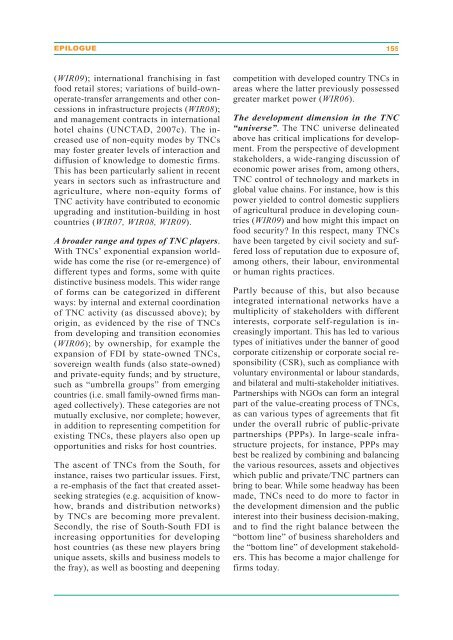UN World Investment Report 2010 - Office of Trade Negotiations
UN World Investment Report 2010 - Office of Trade Negotiations
UN World Investment Report 2010 - Office of Trade Negotiations
Create successful ePaper yourself
Turn your PDF publications into a flip-book with our unique Google optimized e-Paper software.
EPILOGUE 155<br />
(WIR09); international franchising in fast<br />
food retail stores; variations <strong>of</strong> build-ownoperate-transfer<br />
arrangements and other concessions<br />
in infrastructure projects (WIR08);<br />
and management contracts in international<br />
hotel chains (<strong>UN</strong>CTAD, 2007c). The increased<br />
use <strong>of</strong> non-equity modes by TNCs<br />
may foster greater levels <strong>of</strong> interaction and<br />
diffusion <strong>of</strong> knowledge to domestic firms.<br />
This has been particularly salient in recent<br />
years in sectors such as infrastructure and<br />
agriculture, where non-equity forms <strong>of</strong><br />
TNC activity have contributed to economic<br />
upgrading and institution-building in host<br />
countries (WIR07, WIR08, WIR09).<br />
A broader range and types <strong>of</strong> TNC players.<br />
With TNCs’ exponential expansion worldwide<br />
has come the rise (or re-emergence) <strong>of</strong><br />
different types and forms, some with quite<br />
distinctive business models. This wider range<br />
<strong>of</strong> forms can be categorized in different<br />
ways: by internal and external coordination<br />
<strong>of</strong> TNC activity (as discussed above); by<br />
origin, as evidenced by the rise <strong>of</strong> TNCs<br />
from developing and transition economies<br />
(WIR06); by ownership, for example the<br />
expansion <strong>of</strong> FDI by state-owned TNCs,<br />
sovereign wealth funds (also state-owned)<br />
and private-equity funds; and by structure,<br />
such as “umbrella groups” from emerging<br />
countries (i.e. small family-owned firms managed<br />
collectively). These categories are not<br />
mutually exclusive, nor complete; however,<br />
in addition to representing competition for<br />
existing TNCs, these players also open up<br />
opportunities and risks for host countries.<br />
The ascent <strong>of</strong> TNCs from the South, for<br />
instance, raises two particular issues. First,<br />
a re-emphasis <strong>of</strong> the fact that created assetseeking<br />
strategies (e.g. acquisition <strong>of</strong> knowhow,<br />
brands and distribution networks)<br />
by TNCs are becoming more prevalent.<br />
Secondly, the rise <strong>of</strong> South-South FDI is<br />
increasing opportunities for developing<br />
host countries (as these new players bring<br />
unique assets, skills and business models to<br />
the fray), as well as boosting and deepening<br />
competition with developed country TNCs in<br />
areas where the latter previously possessed<br />
greater market power (WIR06).<br />
The development dimension in the TNC<br />
“universe”. The TNC universe delineated<br />
above has critical implications for development.<br />
From the perspective <strong>of</strong> development<br />
stakeholders, a wide-ranging discussion <strong>of</strong><br />
economic power arises from, among others,<br />
TNC control <strong>of</strong> technology and markets in<br />
global value chains. For instance, how is this<br />
power yielded to control domestic suppliers<br />
<strong>of</strong> agricultural produce in developing countries<br />
(WIR09) and how might this impact on<br />
food security? In this respect, many TNCs<br />
have been targeted by civil society and suffered<br />
loss <strong>of</strong> reputation due to exposure <strong>of</strong>,<br />
among others, their labour, environmental<br />
or human rights practices.<br />
Partly because <strong>of</strong> this, but also because<br />
integrated international networks have a<br />
multiplicity <strong>of</strong> stakeholders with different<br />
interests, corporate self-regulation is increasingly<br />
important. This has led to various<br />
types <strong>of</strong> initiatives under the banner <strong>of</strong> good<br />
corporate citizenship or corporate social responsibility<br />
(CSR), such as compliance with<br />
voluntary environmental or labour standards,<br />
and bilateral and multi-stakeholder initiatives.<br />
Partnerships with NGOs can form an integral<br />
part <strong>of</strong> the value-creating process <strong>of</strong> TNCs,<br />
as can various types <strong>of</strong> agreements that fit<br />
under the overall rubric <strong>of</strong> public-private<br />
partnerships (PPPs). In large-scale infrastructure<br />
projects, for instance, PPPs may<br />
best be realized by combining and balancing<br />
the various resources, assets and objectives<br />
which public and private/TNC partners can<br />
bring to bear. While some headway has been<br />
made, TNCs need to do more to factor in<br />
the development dimension and the public<br />
interest into their business decision-making,<br />
and to find the right balance between the<br />
“bottom line” <strong>of</strong> business shareholders and<br />
the “bottom line” <strong>of</strong> development stakeholders.<br />
This has become a major challenge for<br />
firms today.

















